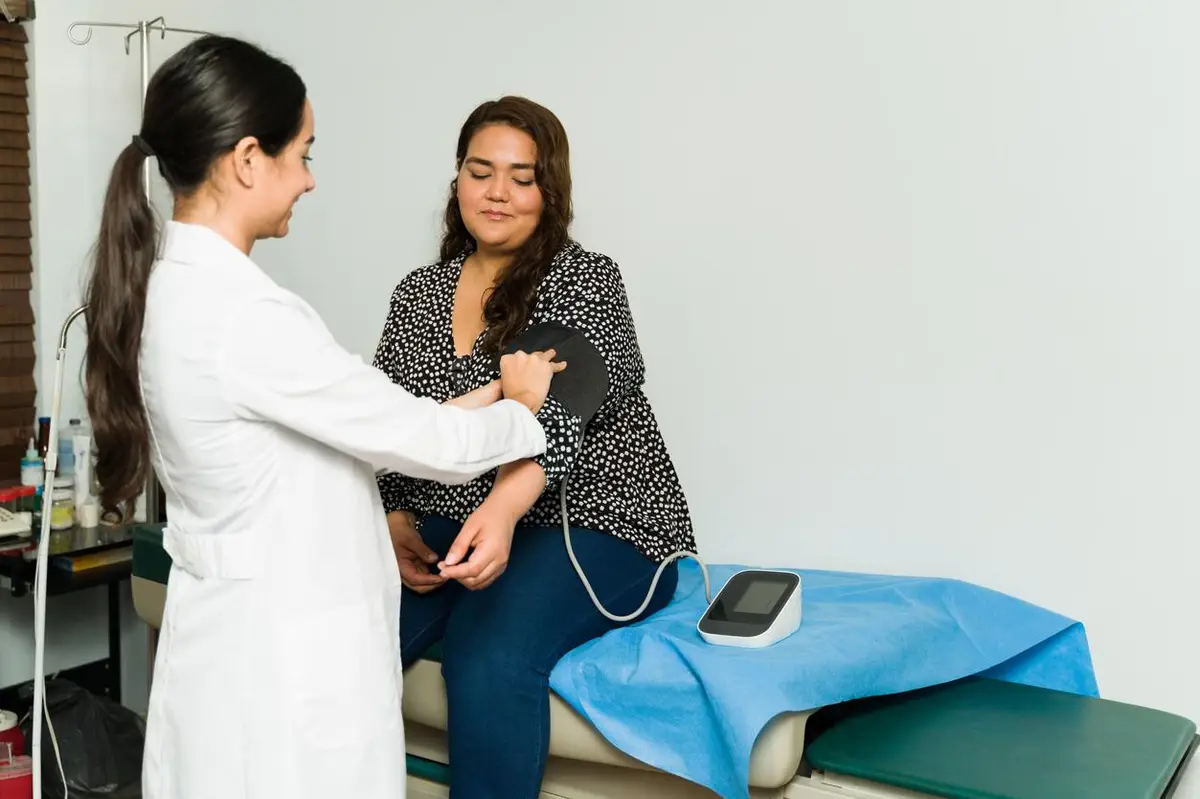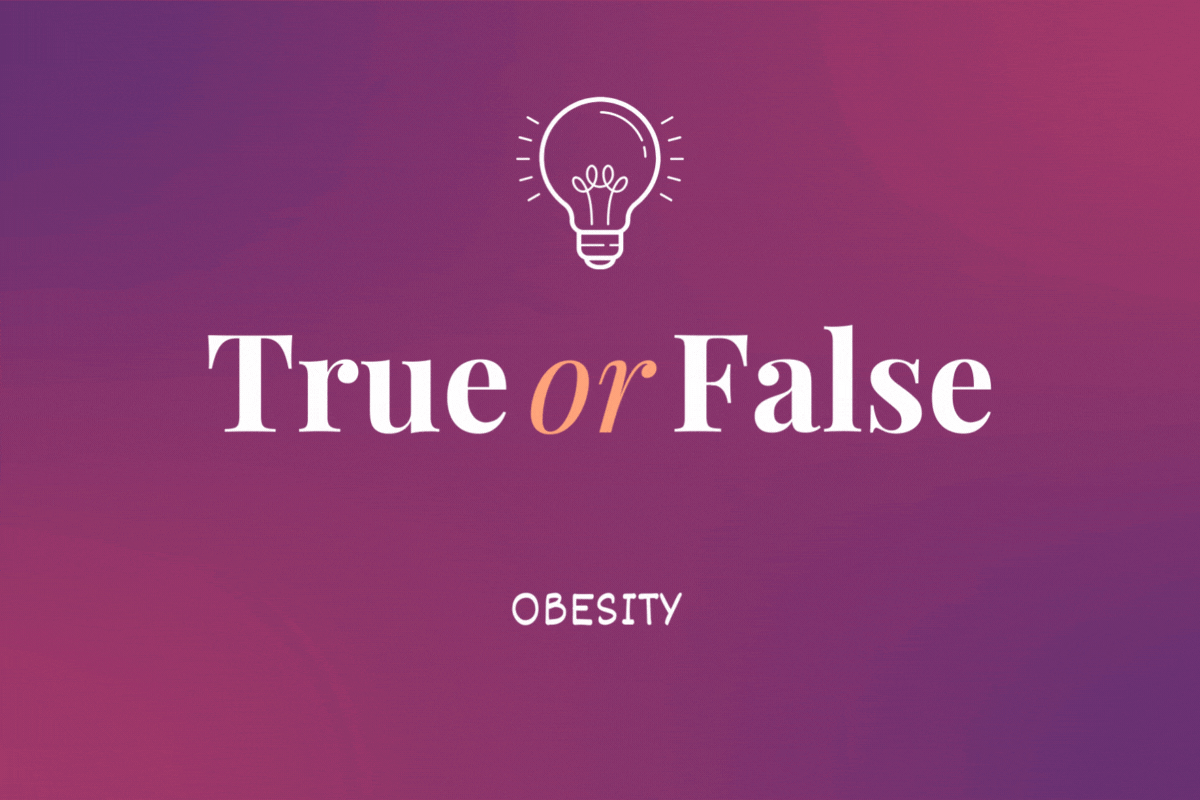For many people living with obesity, managing the disease will include a treatment plan that incorporates different tools at different stages in their weight journey. Take Michele Tedder, for example. Two years after initial success through weight loss surgery, Tedder, senior program manager at Black Women’s Health Initiative and founder of Bariatrically Blessed, realized that it was time to talk to her doctor about next steps in managing her condition. Her weight loss had plateaued, and she was concerned about how it could affect her overall weight management.
“I didn't want to get into a situation where I was starting to gain the weight back,” she said. So she talked to her doctor about medications that could help manage the factors contributing to her weight gain. Like any disease, obesity is highly complex and personal, so having individualized options for anti-obesity medication (AOM) has helped her manage her condition.
Holly Lofton, M.D.,director of the medical weight management program at NYU Langone Health and a member of HealthyWomen’s Women’s Health Advisory Council, explained that early in her career, there were only two medications that could help manage obesity. Those medications were effective for weight loss in some people, but they also came with potentially significant side effects, including increased heart rate, insomnia, digestive problems and other complications. Over the years, many AOMs have been pulled from the market after serious side effects such as psychiatric disturbances, damage to the heart, and drug misuse or dependence.
Over the past decade, however, there have been significant strides in the development of AOMs. There are new medications that work in different ways to be more effective and with fewer side effects.
Dual-action obesity management
One of the key changes, Lofton said, is that newer AOMs are dual-action, which means they work in more than one way to target obesity. Because they work in different pathways, they can be more effective and avoid some of the side effects that occur with single-action medications because you can use a lower dose.
For example, one medication contains both phentermine (an appetite suppressant) and topiramate (a migraine prevention medication that also makes you feel fuller). While doctors had sometimes prescribed stand-alone phentermine for obesity in the past, using the drug on its own often led to insomnia, anxiety, headaches, and increased blood pressure and heart rate. Combining it with topiramate, Lofton explained, makes it possible to use lower doses of the medication effectively.
“It's a greater weight loss impact without the side effects,” she said.
Another recent AOM combines bupropion (an antidepressant) with naltrexone, an opioid antagonist. The bupropion helps increase feelings of fullness while the opioid antagonist helps decrease cravings and the desire to eat. Using both mechanisms, Lofton explained, is key, because the body is an expert at adapting. “When you turn off one pathway to make someone hungry, the body usually revs up another pathway,” she noted. “So by making the dual mechanism, you can get more effective weight loss and also weight loss for a longer period of time.”
Harnessing the power of hormones
Another exciting advance for AOMs is hormonal therapy. Lofton explains that liraglutide and semaglutide are both recently FDA-approved AOMs that work by mimicking hormones in the body that can target obesity. For instance, both medications mimic a hormone that is naturally produced in the intestines that make people feel fuller and less hungry.
Taking these types of medications can provide more of the particular hormones that a person currently makes to feel satisfied and full. “It's giving the patient … a hormone that they may not be making enough of to feel full so they can get greater weight loss,” she said.
Another plus? While both medications may come with minor digestive side effects of nausea or constipation, they carry no cardiovascular side effects like some older anti-obesity therapies.
New anti-obesity medications can offer significant weight loss
If you’d like to add AOMs to your obesity management program, it’s important to talk to your healthcare provider about whether they make sense for your treatment plan, and if they do, which one might be the best treatment for your individual circumstances.
There are currently six anti-obesity medications approved by the FDA for long-term weight management:
- Orlistat
- Phentermine-topiramate
- Naltrexone-bupropion
- Liraglutide
- Semaglutide
- Setmelanotide
Lofton explained that the weight loss that can be achieved with some of the newer AOMs is significant. For instance, based on the averages found in studies for efficacy, semaglutide delivers as much as 18% weight loss, while phentermine-topiramate comes in close behind at 12%, and naltrexone-bupropion offers between 7% and 11% overall weight loss.
In addition, there are also short-term AOMs and other types of medications that can be folded into an obesity disease management plan. For instance, Tedder currently takes a medicine that helps manage insulin resistance (research has shown that insulin resistance and Type 2 diabetes can be drivers in obesity). She also takes other medications to help with cravings.
“It's a journey. It’s not a one and done,” Tedder said of her experience with the disease of obesity. “Just like other diseases that you may need to manage, like hypertension or diabetes … you still have to have a treatment plan that you follow to try to make sure that you're maintaining success. Obesity is no different.”
Tedder is proud of moving past the “blame and shame” portion of the disease that plagues so many and, instead, using resources to help her manage the condition. “If there are tools and instructions that are going to help you to play the hand that you’ve been given, then that's what you’ve got to do,” she said. “I've come to a place of acceptance, and I’m really embracing that I'm someone who is living with obesity. I'm not sitting on the sidelines — I am living my life with obesity. And I actually think I'm running pretty good at this point.”
Tedder encourages anyone who is struggling with their weight to reach out to their doctor to discuss a treatment plan that incorporates multiple tools for success, especially now that there are more options than ever before to treat obesity.
“My primary care provider was very instrumental in getting me to understand that obesity is a disease process and that it wasn’t my fault, that it was bigger than me,” she said. “If this is something you've struggled with all your life like me and you've tried everything … medication may be one of the tools that you need. [Medications are] just more tools in the toolbox to help your body respond in the way that you need to in order to lose weight.”
This resource was created with support from Novo Nordisk.
- Want Fries — or Feelings — With That? ›
- Obesity ›
- Weight Management ›
- What You Need to Know About Obesity ›
- Does Your Health Insurance Cover Treatment for Obesity? ›
- Obesity Throughout Different Life Stages - HealthyWomen ›
- Obesity Is a Complex Disease With a Variety of Treatments - HealthyWomen ›
- The Importance of Obesity Treatment - HealthyWomen ›
- Trying an Anti-Obesity Medication Changed My Life - HealthyWomen ›
- Is Obesity a Disease? Yes. - HealthyWomen ›
- Losing Weight Helped Heal My Mind and Spirit - HealthyWomen ›
- Anti-Obesity Medication Facts - HealthyWomen ›
- I Thought Weight-Loss Surgery Would End My Obesity Struggles - HealthyWomen ›
- Anti-Obesity Medication Stopped My Obsessive Thoughts - HealthyWomen ›
- Can Semaglutide Prevent Alzheimer’s? - HealthyWomen ›
- Why Are Obesity Treatments Hard to Get? - HealthyWomen ›
- Medications You Should Never Stop Abruptly - HealthyWomen ›







